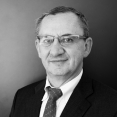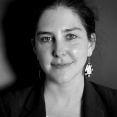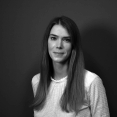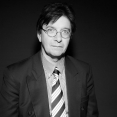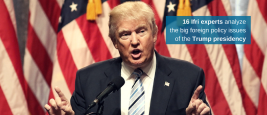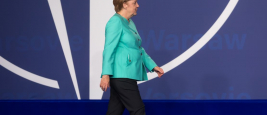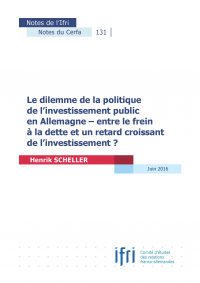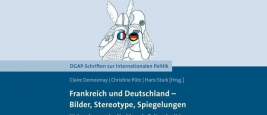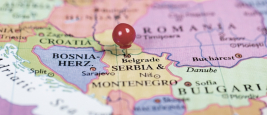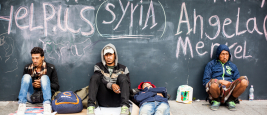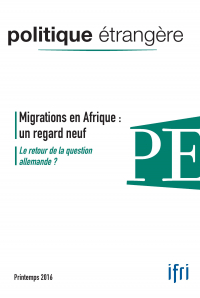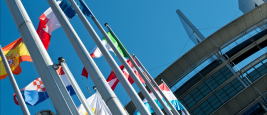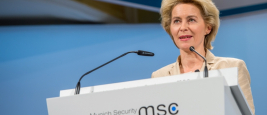What will become of US foreign policy under Donald Trump? A selection of Ifri researchers has come together to offer their thoughts on this question. Our experts cover an array of topics through 14 contributions, ranging from the future Sino-American relations, through US engagement in the...

Germany (Cerfa)
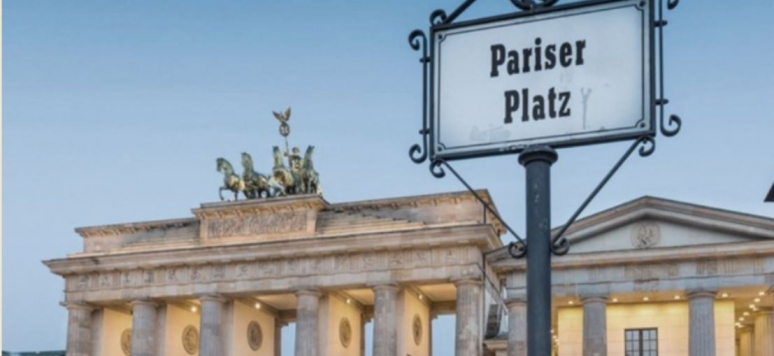
The Study Committee on Franco-German Relations (Cerfa) was founded by an intergovernmental treaty between the Federal Republic of Germany and the French Republic in 1954. It has analyzed relations between the two countries for over 60 years. The Cerfa engages in a wide range of activities. It promotes the Franco-German debate and policy-oriented research through conferences and seminars that bring together experts, policy-makers, decision-makers and civil society representatives of both countries.
The Cerfa publishes regularly books reflecting on the current state of Franco-German relations and two research note series – Notes du Cerfa and Visions franco-allemandes – that target primarily French decision-makers, with the aim of elucidating political, economic and social evolutions in contemporary Germany, and closely following current developments in Franco-German relations.
The Cerfa maintains close relations with the network of German foundations and think-tanks, including the Konrad Adenauer Foundation, Friedrich Ebert Foundation, Heinrich Böll Foundation, German Council on Foreign Relations (DGAP), Genshagen Foundation, French-German Institute (DFI), and German Institute for International and Security Affairs (SWP).
Through its successive interactive and ad hoc cooperation programs, the Cerfa promotes the emergence of a new Franco-German generation:
- In the year 2021, the Cerfa started a Program on Multilateralism with the Konrad Adenauer Foundation in Paris. This program aims at creating a Franco-German network bringing together young professionals interested in the topic of multilateralism in the context of their work. It consists in working sessions based on briefings and workshops with selected experts and practitioners covering a broad range of issues relating to multilateralism, such as international trade, health, human rights and migration, non-proliferation and disarmament.
Previous initiatives:
- The Franco-German Future Dialogue co-organized by the Cerfa together with the DGAP and with the support of the Bosch Foundation aimed at creating a new Franco-German generation by developing exchanges and debates between French and German young professionals and PhD students.
- The Daniel Vernet Group (formerly the Franco-German group of reflection) had been founded in the Fall of the year 2014 at the initiative of the Genshagen Foundation.
Secretary General of the Study Committee on Franco-German Relations (Cerfa)
...Research Fellow, Study Committee on Franco-German Relations (Cerfa)
...Research Fellow, Study Committee on Franco-German Relations (Cerfa)
...Assistante
Counselor on Franco-German relations at Ifri
...The 2016 White Paper on security policy and the future of the Bundeswehr is testament to Berlin’s declared will to play a more active role internationally, to assume more responsibility and to provide leadership in close concertation with its partners in Europe and the world.
German agriculture is characterized by regionally different farm structures but in the midst of a transformation process. Rapid structural change is seen especially in animal production. Total production increased during the past decade due to intensification but the number of labour force...
The German debate about public investment policyfaces a dilemma. The deficits in public infrastructure have grown considerably due to comparatively low investments in recent years. In addition, substantial investments for promising mega-projects, such as the energy transition (“Energiewende”)...
Pictures are an integral part of the process of conveying the state and character of French-German relations. Such pictures highlight not only justified criticisms but also prejudices and clichés. The use of these pictures has intensified since 2008 because the financial and EU crises...
Are we returning to “The German Question”, which we thought had been dealt with at unification? Although “The German Question” has deep historical roots, its return is indicative of a European crisis: economic fractures, institutions in deadlock, relative withdrawal of France and the UK on...
The conflict in and about Ukraine has catapulted the European Union's Eastern Partnership (EaP) into the limelight of international attention. Belittled as a bureaucratic and technical policy instrument, the European Neighbourhood Policy and the EaP as its Eastern regional dimension have...
Since the speeches delivered by President Joachim Gauck, Minister of Foreign Affairs Frank-Walter Steinmeier and Minister of Defence Ursula von der Leyen at the 2014 Munich Security Conference, Germany has seen a debate on new responsibilities in its foreign and security...



